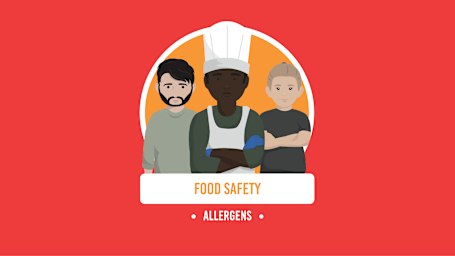
Food Allergen Awareness
Course Overview
All food and drink handlers have a legal responsibility to ensure that the produce they manufacture, sell or serve is safe for the consumer to eat, and this is particularly true when providing food products to people with food allergies or intolerance.
This online Food Allergen Awareness course will teach you more about the foods that commonly trigger allergic reactions and develop your understanding of the legal responsibilities of a food handler in regards to allergen labeling and declaring which allergens are present in your food products.
The course ensures that you will comply with your duties under the Food Labeling Regulations 1996 and the European Provision of Food Information to Consumers Regulation 2011, which require all food handlers to have knowledge of allergens and be able to provide allergen information for all food sold.
Course Outline
The course is divided into 4 easy to follow modules includes a multiple choice test at the end:
- Introduction to Allergens
- Allergens and the Law
- Controlling Allergenic Contamination: Ingredients
- Controlling Allergenic Contamination: Hygiene
Target Audience
This course is suitable for food and drink handlers in all types of establishments, including catering, retail and manufacturing businesses. The course is appropriate for workers of all levels including managers and supervisors, full-time staff and part-time staff.
Learning Objectives
By the end of this course learners will:
- Identify the 14 allergenic ingredients that must be declared in food products.
- Be aware of the common symptoms of allergic reactions.
- Have knowledge of the legal responsibilities of food handlers in regards to allergen labeling and declaration.
- Understand the differences between food allergies, food intolerance, anaphylaxis and coeliac disease.
- Explain the appropriate actions to take to minimise the risk of allergen contamination.
- Consider the different kinds of allergens that may be found in certain types of cuisine.







